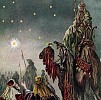On October 1, 911, St. Andrew the “fool for Christ” had a vision as he prayed in the Blachernae church in Constantinople. Above the crowd of faithful Christians gathered there for the Vigil service, he beheld the Mother of God with her arms outstretched and holding a veil over the people. St. Andrew, and his disciple Epiphanios, understood this to be a revelation of the Mother of God’s protection of the faithful. From that time, this revelation has been commemorated in the Church in the October 1 feast of the Protection (Pokrov in Slavonic) of the Most Holy Theotokos, also known as “The Protecting Veil.”
As is often the case with the saints known as “holy fools,” St. Andrew’s apparent foolishness was a kind of protection in itself – it masked his great spiritual gifts and allowed him to remain in relative obscurity and deep humility. But while the world saw him as an imbecile, he was able to recognize the deeper reality missed by his more sophisticated neighbors. The same was true, in fact, of the Virgin herself. While the world misunderstood – and at first even Joseph was scandalized – she, in her great humility and simplicity, accepted the will of the Lord for her, and so became the Royal Door through which our Lord came incarnate into the world.
The Virgin’s “yes” to God is what leads to the deeply reassuring image and reality of her protection, which we celebrate on this feast. This image of the Theotokos as our protection is firmly rooted in the tradition of the Church, going back much earlier than St. Andrew’s vision. It is seen, for example, in the prayer before communion of St. John Chrysostom (5th in the traditional order), in which we address the Theotokos as “my protection.”
In considering how we understand her protection, we might look first at the “burning bush” passage from Exodus, which is read at Vespers for this feast (Ex. 3:1-8). The Church takes the burning bush, which was unconsumed by the divine fire, to be an image of the Virgin Mary, who “contained the uncontainable” and was filled with the uncreated fire of God without being consumed. Though she no longer bears the developing fetus of the God-man in her womb as she once did, she remains the vessel of divine grace. In other words, where she is, there also is the God who chose her and sanctified her, and who through her grants us His protection. I imagine that if Moses had been suddenly attacked by enemies while standing next to that burning bush, he would have been kept safe from harm, and his enemies would not have fared so well. Likewise, if we are in the vicinity of the human “Burning Bush,” we are in the vicinity of the power of God that abides with her. In this she symbolizes and embodies the Church herself, under whose protection we remain as long as we are her faithful children.
Next, we might recall the moment at which the Mother of God is revealed as an intercessor at the wedding in Cana (Jn. 2:1-11). Here she provides “protection” in a very mundane circumstance: by entreating her Son, she protects the wedding hosts from the embarrassment of running out of wine. On a more profound level, we see her role as one who, along with all our saintly intercessors, protects us by her prayers from losing altogether the wine of divine life, as we experience the watering-down effects of the many worldly temptations we face.
Finally, her protection is found precisely in the humility that became the “raw material” of the incarnation, and which crowned her with the title “Panagia.” She receives this title, which means “all-holy,” precisely because she recognizes her lowliness and so is exalted by God. Humility is the “secret weapon” of the spiritual life, which enables us to pass through all the enemy’s snares, as St. Anthony says. It is because she sees herself as totally unworthy of being chosen by God that He chooses her, and makes her impervious to the power of evil. The enemy, who cannot comprehend such humility, is utterly undone by it. May we, through the prayers of the Panagia, and of St. Andrew the Holy Fool, come under the protecting veil of such humility, and so be made fit vessels for the grace of God.
|
| |||||||||||||


 Find us on Facebook
Find us on Facebook Orthodoxy in America
Orthodoxy in America



